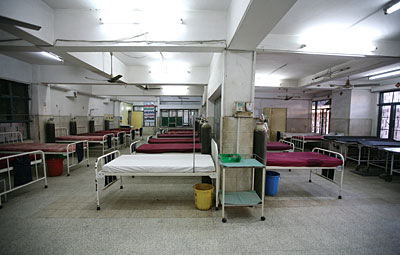 KIRAN PANDAY Doctor in the house? Bir Hospital strikes in January last year, demanding security for staff |
I was escorting a friend to a hospital on New Year's Day, who after having completed a 50km marathon complained of feeling drowsy, fell to the ground, and started having full body convulsions. The doctor's solemn assertion followed a nurse's monitoring of the patient's vitals and a statement that "her BP is normal".
The doctor's statement only emphasised that my friend was in need of serious medical attention and consent was given for any medical tests and procedures he found necessary. I probably would not have thought much about this exchange had a newly graduated doctor friend not said the following:
"Yeah, we tell patients all the time that they might die. Doctors are getting beat up all over the place when patients die. Who wants to take risks?"
The young doctor sounded reasonable, but what stood out during the exchange was the blasé manner in which the statement was delivered, as if there were no moral or ethical repercussions of an exaggerated medical prognosis.
One casual conversation is not enough to make generalisations about the profession, but it does suggest that we might have a growing problem in our society. Doctors are getting beat up all over the place. As I found out later, the hospital I was in had been vandalised and padlocked by protestors over a patient's death only a few weeks earlier. For years, doctors have asked for increased security, even calling for bandas in order do so.
There was a time when doctors worried that giving bad news was akin to giving bad medicine and wrestled over whether full disclosure was better or worse for treatment. With the increase in the assertion of consumer rights, informed consent is the new norm. But here we have now gone past the truth about the patient's illness. Doctors now feel their security lies in giving the worst possible diagnosis, i.e. death.
A consent given on the basis of false information �" blackmail of sorts when you are told you will die �" is not a valid consent. Doctors are neglecting their duty to explain to patients the true status of their condition so the patient can make an informed medical decision. Worse, when blanket claims of death are made malpractice will be harder to investigate, if investigated at all.
This is our creation. First we put doctors on the same pedestal as gods, and when they fail we resort to our Neanderthal tendencies. Hospitals can perhaps help by creating a mechanism whereby medical grievances can be taken up. Legal mechanisms to take such claims to court have now gained some precedence with the first successful claim for damages for medical malpractice last year.
I have no reason to argue that the doctor who was diagnosing my friend did not tell the truth that day, or that he didn't perform his duty. She was given good medical care, although palliative care could have been better. The salt levels in her body had been flushed out due to excessive water intake. A few days later, her electrolytes healthily replenished, she was discharged from hospital, and was gaily climbing hills and running again. What does vex me, in retrospect, is whether he did tell the truth, or had the mob killed his ability to be empathetic?
All of this comes with the caveat, of course, that doctors can never promise cures, and death is the eventual truth of all of our lives. But as someone once said we can't be casual about the truth. And doctors should be guaranteed an environment where they feel secure enough to share the truth about their patients' health.
READ ALSO:
Vacuum ahead, PRASHANT JHA
Seizing the moment, DAMAKANT JAYSHI
Ignorant crusaders, ASHUTOSH TIWARI



